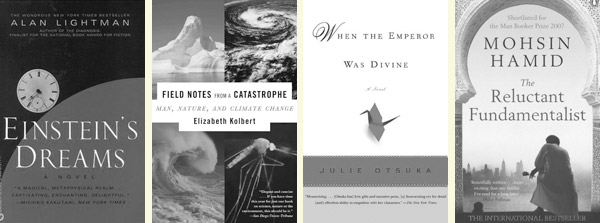Scene
Beneficial or boring? The Freshman Reading Program
The Freshman Reading Program
The Freshman Reading Program: It’s one of the most overlooked and forgotten elements of a freshman’s appearance on campus, yet it is something we all went through almost immediately after arriving at Wash. U. You would sit in a group with some portion of your floor and talk about whatever book had been assigned to your class. Yes, the process was invariably somewhat awkward. Nobody really knew anyone else, some of the people certainly hadn’t completed—or even started—the book, and who really wanted to have an academic discussion before classes started, anyway?
Despite this characterization, the Freshman Reading Program has not been a truly negative force. It continues, drawing students together for their “first academic exercise at Washington University,” according to the program’s Web site. Students have the opportunity to meet a faculty member outside the formal classroom setting, yet still in a teacher-student fashion. Through this, students get a feeling of what classes are like at Wash. U., and learn about their fellow undergraduates.
 MCT Campus
MCT Campus Covers for the books chosen for the Freshman Reading Program from 2007 to 2010.
The Class of 2013’s book was “When the Emperor Was Divine” by Julie Otsuka, designed to tie into several of the year’s events. Commemorating the Japanese-American internment during World War II, Wash. U. tied in several events throughout the fall, culminating in the author’s talk on campus midway through the semester.
The administration’s intention to make the Freshman Reading Program applicable to more than just Orientation is not limited to the Class of 2013. Throughout next semester there will be talks and other activities centered around the themes found in next year’s book. This is designed to “provide a common intellectual experience” for the incoming freshmen and foster some form of camaraderie between them. Jeremy Auster, a freshman, echoed this sentiment, saying, “It was one of the first things we did as a floor, and it helped me get to know the kids on my floor a little bit better.”
The book for the incoming freshman class is “The Reluctant Fundamentalist,” by Moshin Hamid. The novel itself has been popular, becoming an international best-seller and reaching the New York Times Best Seller List soon after its release in April 2007. Most notably, it has been popular at various colleges. Wash. U. is by no means the first university to make “The Reluctant Fundamentalist” required reading for incoming freshmen. In 2008, Tulane University in Louisiana sent a copy to all incoming undergraduates, and the University of St. Andrews followed suit in 2009.
Student’s reactions to the program itself have been balanced. “Honestly, it didn’t stand out, and I don’t remember it that well,” said Auster, “I don’t necessarily regret reading it, but I don’t feel like I absolutely had to read the book. The discussion itself wasn’t that meaningful necessarily—it wasn’t important to do that—but it was good to discuss an interesting issue with kids I hadn’t met before.”
Some students believe that the program is an encouraging concept, but improperly implemented. Freshman Madeline Rossman said, “It was good in theory, but in practice it didn’t work out. Nobody wanted to be in class at the beginning of the year, and it was awkward because the teacher asked questions and some people hadn’t read the book. We got to meet new people though, so that was good. It would have been better if the book had been more modern.” Hopefully, with “The Reluctant Fundamentalist,” Wash. U. has found a book to which the incoming freshman class can connect.
